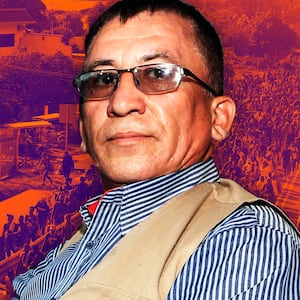Donald Trump and his political allies have embarked on an aggressive, end-of-the-campaign effort to drum up fear among voters about a caravan of poor migrants several thousand miles from the U.S.-Mexico border. Much of it is mistruths and embellishments, but Trumpland could care less.
“It doesn’t matter if it’s 100 percent accurate,” a senior Trump administration official told The Daily Beast. “This is the play.”
Over the past few days, Trump has issued cryptic warnings about the southern border being overrun. His vice president has amplified baseless accusations that terrorists may have infiltrated the group of—largely—Honduran asylum seekers. And conservative media have provided ’round-the-clock coverage of what they depict as a mob gaining in size and steam.
Stoking immigration fears is a tried and true political winner for the Republican Party. In 2014, GOP lawmakers were able to capitalize on a surge of families rushing to the southern border and opaque warnings that ISIS agents, carrying the Ebola virus, could sift through undetected.
Trump, however, has perfected the art. In 2016, his top domestic policy item was to build a border wall to prevent an overflow of undocumented immigrants from coming into the country. He did this—and did it successfully—despite illegal immigration being at a 40-year low.
In 2018, Trump has reprised the lines but with a touch of additional MAGA flair. On Monday night, the president proudly affirmed that he is a “nationalist” politician—adopting a term that often carries the baggage of “ethno-nationalism” or “white nationalist” neo-fascism that, among other horrors, culminated in the Charlottesville atrocity last year.
Trump himself seemed aware of the risks he took in adopting the moniker, telling the crowd that he wasn’t supposed to “use that word.” But, in reality, it was merely a continuation of the 2016 playbook. His campaign manager during that run, Steve Bannon, was thrilled to hear Trump embrace the nationalist tag, according to the former’s friends. When Bannon worked in Trump’s West Wing last year, he put administration priorities on his office whiteboard under the heading of “POPULIST” and “NATIONALIST,” according to those who saw it.
For Republicans, the sharp turn toward immigration fears, and those related to the caravan in particular, has been viewed a clear political winner, even as some acknowledge that the rhetoric from the president and others—including the accusation that philanthropist and Democratic financier George Soros was funding the caravan—has been overblown.
“Soros is probably not masterminding these people coming to the border,” conceded one GOP operative in an interview on Tuesday. “When it comes to allowing segments of the base to believe what they want to believe, it happens on both sides. Republicans are no more guilty of it than Democrats.”
What made the caravan politically useful, the operative continued, was that it resonated with precisely the voter sect that the GOP needed to reach in the next two weeks. “It's an issue that motivates Trump's most ardent conservative base,” the operative said. “If your worry was that we’re not going to be able to turn our base voters out, well—what’s the opposite of kryptonite?”
Publicly, the White House has defended the president’s insistence that the caravan contains “criminals” and “unknown Middle Easterners.” But it hasn’t always been graceful. On Tuesday, Vice President Mike Pence softened the charge to merely “people of Middle Eastern descent.” His office then said that 10 suspected terrorist were apprehended by the U.S. every day—conflating those captured worldwide with those found along the southern border. Later that day, the president himself seemed to concede that he’d been riffing it while arguing that there was the possibility that he could end up being correct.
In a conference call with reporters on Tuesday, senior administration officials declined to defend the claims coming from the president himself, referring reporters to “the Mexican authorities” on questions about the construct of the caravan. “The president has made his comments on it, we’re not going to speak for him on what that looks like,” said one of the officials, whom the White House made available on the condition of anonymity.
But the absence of supporting evidence has not slowed the administration down. A recent White House email blast of talking points to Trump surrogates and media allies, sent and compiled by White House aide Julia Hahn, strongly emphasized the “caravan” and the supposed “crisis” at the border, according to those who have read the email. And even Republican critics of the president and his use of the caravan catnip conceded that it would have a tangible electoral impact.
“I do think it works that’s why he does it,” Sen. Jeff Flake (R-AZ) said in an interview. “I’m not saying there are never any people with nefarious motives. But [President Trump] didn’t say that based on any evidence… it was just thrown out there because he knows it works.”
To date, the caravan hasn’t made its way into any campaign advertisements. But one top GOP official involved in House races said it was just a matter of time. “It’s a little new but I’d be shocked if it wasn’t in one soon,” the operative said.
But ads aren’t exactly needed to give the issue any more attention. Despite posing no clear or immediate threat to U.S. national security, the caravan has become a fixture of the political conversation and national media broadcasting. Google search analytics show significantly more interest in the “caravan” than in “health care” starting on Sunday. The New York Times put the story above the fold two days in a row.
How it got to that point illustrates the ways in which a flattened media landscape can allow fringe-ish stories to take root and bloom into national controversies. Trump wasn’t the first Republican to circulate rumors about a “CARAVAN” in an attempt to rile up Republicans ahead of the midterms. That would be Rep. Matt Gaetz (R-FL), a staunch Trump defender, who on Oct. 17, tweeted video he claimed was members of the caravan receiving money, possibly from Soros, in Honduras to “join the caravan & storm the US border @ election time.” Gaetz’s video has been retweeted more than 44,000 times, as of Tuesday, and received nearly 2 million views.
Gaetz eventually conceded that the video was shot in Guatemala, not Honduras. And, since the migrants in the video received just a single bill, the most they could have received was roughly $26—hardly enough to induce someone to travel thousands of miles to “storm the US border.”
Still, Gaetz’s video went viral alongside the idea that the migrants are for some reason intent on reaching the United States before Election Day. Pro-Trump Facebook and Twitter accounts have shared pictures of a Mexican police officer with a bloody face, claiming it’s proof that members of the caravan have overrun Mexican law enforcement. In fact, the images were from an unrelated protest six years ago.
Trump supporters have also seized on an image of Hondurans burning an American flag with a swastika drawn on it, dubbing them the “caravan protesters” and implying that they were members of the caravan.
In a widely circulated tweet retweeted by conservative columnist Ann Coulter, right-wing social media personality Vincent James wrote, “Damn these Honduran migrants seem like they really want to come here.” In reality, the Hondurans were protesting in front of the U.S. Embassy in Honduras and weren’t members of the caravan.
The caravan issue has even earned its own “Bikers for Trump” hoax, with online rumors flying around that a horde of Trump-loving bikers were headed to the border to stop the caravan before it crossed into U.S. territory.
For Democrats watching it all unfold, the past few days have produced a nauseating case of déjà vu. Matt Canter, who headed communications for the Democratic Senatorial Campaign Committee in 2014, recalled how the closing weeks of that cycle turned on “border crossings, Ebola, and beheadings.” Though Canter suspected that voters had become “a little sick of the baiting and the scare tactics”—citing the failure of Ed Gillespie to win the Virginia gubernatorial election in 2017 by pivoting to fear-mongering over MS-13 gangs—he conceded that the caravan story likely would hurt.
“I think these last couple weeks matter a lot,” said Canter. “I think they matter a ton. And I think that atmospherics matter.”











